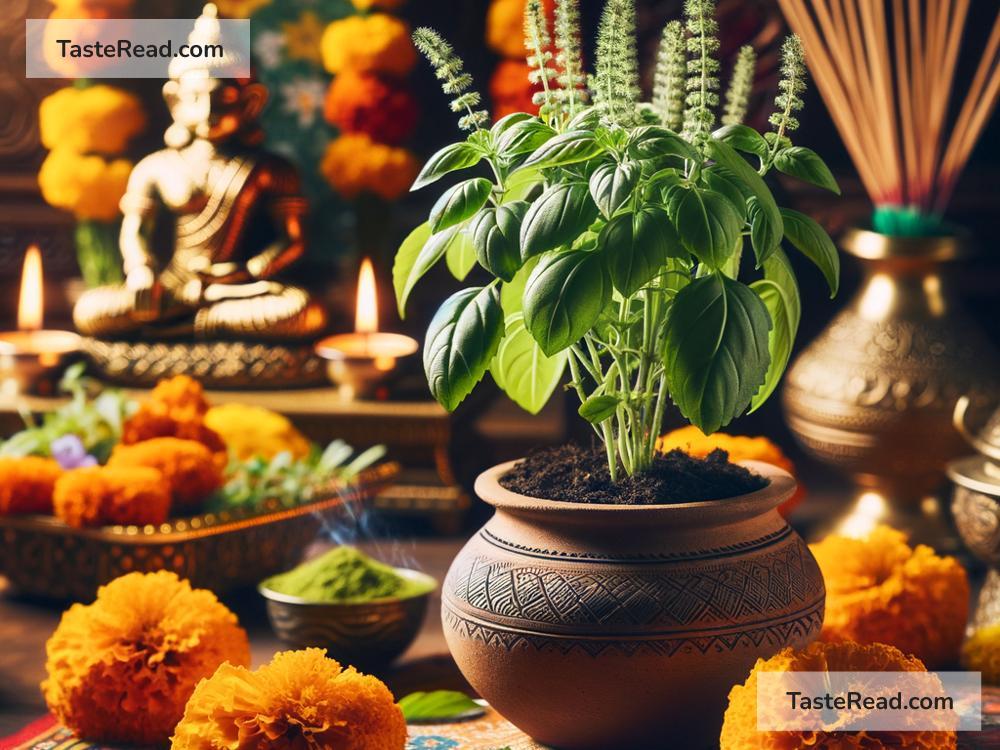Why Basil is Considered a Sacred Herb in India
When you think of holy plants in India, basil, specifically “Tulsi” (Ocimum sanctum), is likely the first one that comes to mind. Tulsi is more than just a herb in India—it is revered as a symbol of purity, health, and spirituality. Hindus not only grow Tulsi in their homes but also worship it daily. This little plant has woven itself deeply into India’s cultural, spiritual, and medicinal traditions over thousands of years.
But you might wonder: How did Tulsi earn this status? Let’s delve into that question and explore why basil is considered sacred in Indian culture.
Tulsi: The ‘Queen of Herbs’
Tulsi is often referred to as the “Queen of Herbs” due to its incredible medicinal, spiritual, and cultural significance. The name “Tulsi” means “the incomparable one,” and this herb truly lives up to its name in the Indian context.
Tulsi is not merely a plant; it is an important part of Hindu rituals and beliefs. Its presence in Indian households is almost universal, as it is considered auspicious and protective. The small plant is treated with great respect and is frequently seen growing in courtyards, gardens, and temple compounds.
Tulsi in Hindu Mythology
The sacredness of Tulsi has its roots in religious stories and Hindu mythology. According to ancient texts and legends, Tulsi is believed to be an incarnation of Goddess Lakshmi, the consort of Lord Vishnu. Devotees believe that planting and caring for Tulsi brings blessings, prosperity, and happiness to the home.
One famous legend explains Tulsi’s divine origin. It tells the story of Vrinda, a pious woman who was the wife of the demon king Jalandhara. Because of her unwavering devotion to Lord Vishnu, she transformed into the Tulsi plant after her death, symbolizing purity and loyalty. This connection made Tulsi sacred to Lord Vishnu, one of Hinduism’s principal gods.
As a result, Tulsi plays an important role in many rituals dedicated to Vishnu and his avatars, like Lord Krishna and Lord Rama. In fact, Tulsi leaves are often used as offerings during prayers and ceremonies. Without Tulsi, many rituals are considered incomplete.
The Tulsi Plant in Daily Worship
Tulsi is more than just sacred—it’s a daily reminder of spirituality and devotion. In many Hindu homes, Tulsi is worshiped every morning and evening. Families light oil lamps near the plant and offer prayers. Chanting mantras, watering the plant, and circling it are common practices that signify respect and gratitude.
The Tulsi plant is often grown in a specially designed structure called a “Tulsi Vrindavan.” This is usually placed in the courtyard or near the house entrance, surrounded by a decorative boundary. It stands as a protective guard for the home, believed to ward off evil and negative energies.
Tulsi is also used as a spiritual offering during important festivals like Tulsi Vivah, which marks a ceremonial marriage between Tulsi and Lord Krishna. This festival celebrates the bond between nature and divine forces, showcasing Tulsi’s unique role in Hindu spirituality.
Medicinal Significance of Tulsi
Tulsi’s importance is not limited to spirituality; it is also celebrated for its strong health benefits. In Ayurveda, the ancient Indian system of medicine, Tulsi is considered to be a natural healer. It is known for its ability to boost immunity, combat illnesses, and improve overall well-being.
Tulsi contains powerful antioxidants and antimicrobial properties that protect the body from infections, reduce inflammation, and calm the mind. It is often used in herbal teas, oils, and remedies for various ailments such as colds, coughs, digestive issues, and stress. Indians have long relied on Tulsi as a “go-to” remedy for common health problems.
Interestingly, modern science backs up many of these claims, highlighting Tulsi’s medicinal properties. Studies have found that the herb may help reduce blood sugar levels, support heart health, and promote mental clarity.
Symbol of Environmental Harmony
Beyond its spiritual and medicinal benefits, Tulsi also serves as a symbol of environmental harmony. Its fragrant leaves purify the air, while the plant itself is easy to grow and sustain. Tulsi reminds people of the importance of living in balance with nature. By growing and nurturing Tulsi, devotees connect themselves to the earth and its natural cycles.
A Link Between the Physical and Divine
Tulsi is a unique example of how nature and spirituality are intertwined in Indian culture. For Hindus, Tulsi acts as a bridge between the physical world and the divine. Planting, caring for, and worshiping Tulsi brings a sense of purpose and connection. Its presence soothes the soul and helps families create a spiritual atmosphere within the home.
Conclusion
Tulsi, the holy basil, is much more than a plant in India—it’s a way of life. Its roots go deep into religion, mythology, medicine, and ecology, giving it a multidimensional value. Worshiping Tulsi is an act of devotion, a celebration of nature, and a commitment to health and well-being.
In a rapidly modernizing world, Tulsi continues to hold its sacred status in India. It reminds us of the timeless wisdom in our traditions and the importance of staying connected to nature and spirituality. Whether you’re exploring Hindu culture or looking for a powerful herb to add to your daily life, Tulsi truly stands out as “the incomparable one.”


